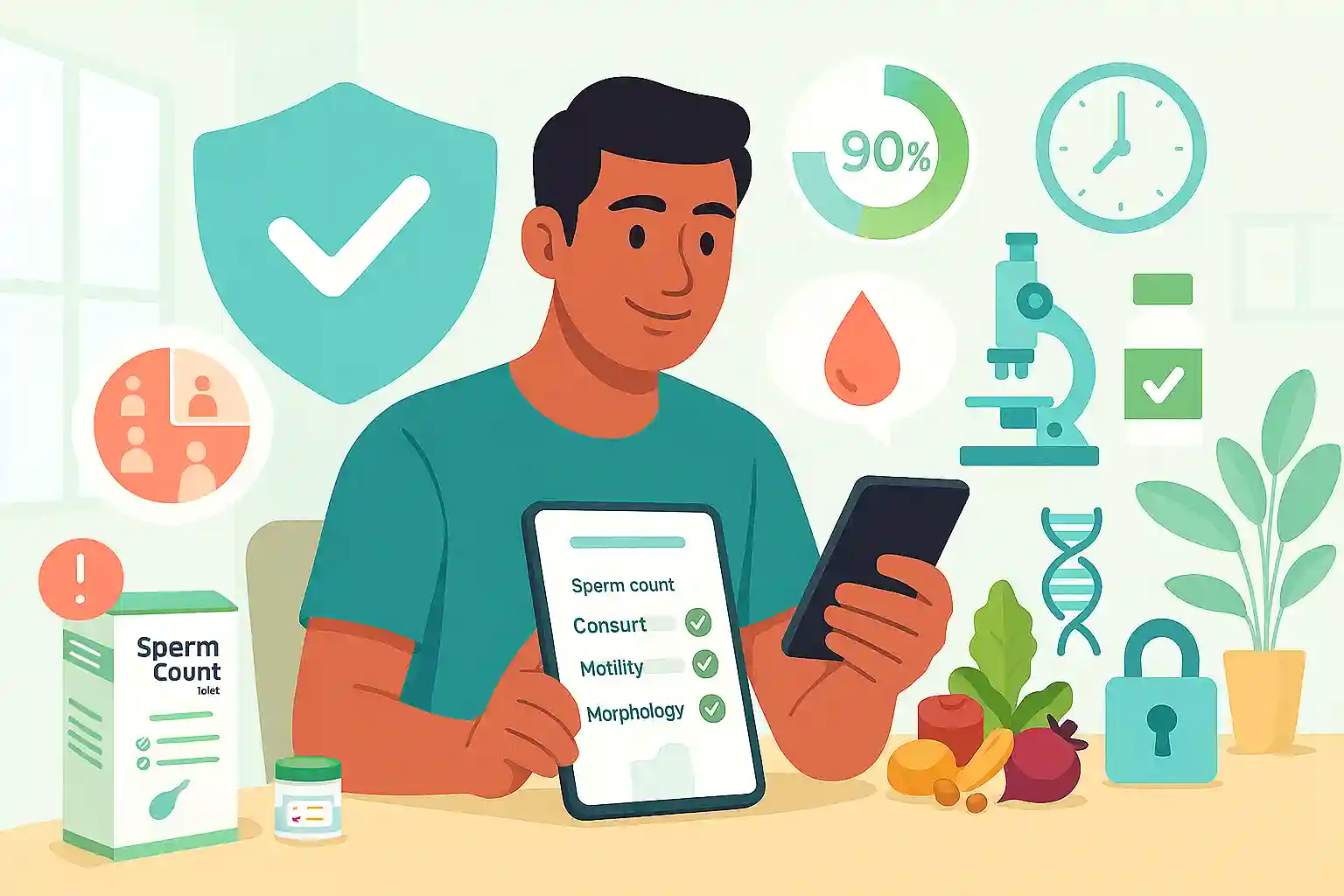"Your sperm count is low." These five words can feel devastating, but they're not a dead end. Low sperm count (oligospermia) affects about 15% of men worldwide and is one of the most treatable causes of male infertility. The key is knowing what to do next and taking action systematically.
Here's your complete roadmap from diagnosis to treatment, including immediate steps, lifestyle changes, medical options, and when to consider assisted reproductive technologies.
Understanding Your Results
Sperm Count Classifications:
- Normal: 15+ million sperm per mL
- Mild oligospermia: 10-15 million per mL
- Moderate oligospermia: 5-10 million per mL
- Severe oligospermia: Less than 5 million per mL
- Azoospermia: No sperm found in semen
Important: One test doesn't determine your fertility. Sperm production varies, and you need at least 2-3 tests spaced 2-3 months apart for accurate assessment.
Immediate Next Steps (This Week)
Don't Panic - Take Action:
- Schedule a repeat semen analysis in 2-3 months
- Book consultation with urologist or fertility specialist
- Start basic lifestyle modifications immediately
- Begin taking antioxidant supplements
- Share results with your partner for joint planning
Additional Tests to Request:
- Hormone panel: FSH, LH, testosterone, prolactin (₹2000-3000)
- Complete semen analysis with morphology
- Scrotal ultrasound to check for varicocele (₹1500-2500)
- Genetic testing if sperm count very low (₹8000-15000)
- Thyroid function test (₹500-800)
Lifestyle Changes That Work
Start These Immediately:
- Quit smoking completely - improves sperm count by 50% in 3 months
- Limit alcohol to 2 drinks per week maximum
- Maintain healthy weight (BMI 20-25)
- Exercise regularly but avoid excessive cycling or hot yoga
- Sleep 7-8 hours nightly for hormone balance
Avoid These Sperm Killers:
- Hot baths, saunas, and tight clothing
- Laptops directly on lap
- Anabolic steroids and unnecessary supplements
- Excessive stress and anxiety
- Recreational drugs including marijuana
Evidence-Based Supplements
Proven Supplements for Sperm Count:
- Folic acid (5mg) + Zinc (66mg): Increases count by 74%
- Coenzyme Q10 (300mg daily): Improves motility and count
- Vitamin C (1000mg): Protects sperm from damage
- Vitamin E (400 IU): Antioxidant protection
- L-Carnitine (3000mg): Enhances sperm energy
- Lycopene (20mg): Found in tomatoes, improves quality
Cost-Effective Options in India:
- Generic fertility supplements: ₹1500-3000/month
- Individual vitamins: ₹500-1000/month
- Prescription fertility formulations: ₹2000-5000/month
Medical Treatment Options
Based on Underlying Cause:
- Varicocele repair: Surgery improves count in 70% of cases
- Hormone therapy: If testosterone/FSH levels abnormal
- Infection treatment: Antibiotics for reproductive tract infections
- Medication review: Stopping fertility-affecting drugs
- Surgical sperm retrieval: For severe cases
Treatment Costs in India:
- Varicocele surgery: ₹50,000-1,50,000
- Hormone treatments: ₹2,000-5,000/month
- Fertility specialist consultation: ₹1,000-3,000/visit
- Advanced sperm tests: ₹5,000-15,000
When Natural Conception Is Still Possible
You Can Still Conceive Naturally If:
- Sperm count above 5 million per mL with good motility
- Partner has normal fertility
- You're under 40 years old
- No additional male or female fertility factors
- Trying for less than 12 months
Maximize Natural Conception Chances:
- Time intercourse during partner's fertile window
- Maintain abstinence period of 2-5 days between ejaculations
- Use fertility-friendly lubricants
- Consider sperm-friendly positions
- Track ovulation with apps or kits
Assisted Reproductive Technology Options
IUI (Intrauterine Insemination):
- Best for: Mild to moderate low sperm count
- Success rate: 10-15% per cycle
- Cost in India: ₹15,000-25,000 per cycle
- Usually try 3-4 cycles before moving to IVF
IVF with ICSI:
- Best for: Severe oligospermia or failed IUI
- Success rate: 40-50% per cycle
- Cost in India: ₹1,50,000-3,00,000 per cycle
- ICSI directly injects sperm into egg
Advanced Options:
- TESA/PESA: Surgical sperm extraction for azoospermia
- Donor sperm: If no viable sperm can be retrieved
- Sperm washing and concentration techniques
- Genetic screening of embryos (PGS/PGD)
Timeline for Improvement
What to Expect:
- Sperm production cycle: 74 days from start to maturation
- Lifestyle changes show effects: 3-6 months
- Supplement benefits: 3-4 months minimum
- Post-surgery improvement: 6-12 months
- Don't expect immediate results - be patient
Emotional Support and Coping
Managing the Emotional Impact:
- Join male fertility support groups online
- Consider counseling individually or as a couple
- Focus on what you can control (lifestyle, treatment)
- Communicate openly with your partner
- Don't isolate yourself - seek support from friends/family
Remember:
- Low sperm count doesn't define your masculinity
- Many men with low counts father children successfully
- Treatment options continue to improve
- Your partner's support is crucial - this is a team effort
Financial Planning
Budget Considerations:
- Basic evaluation and supplements: ₹10,000-20,000
- Medical treatment: ₹50,000-2,00,000
- IUI attempts (3-4 cycles): ₹75,000-1,00,000
- IVF-ICSI (2-3 cycles): ₹3,00,000-8,00,000
- Check insurance coverage for fertility treatments
Choosing the Right Doctor
Look for:
- Board-certified urologist or reproductive endocrinologist
- Experience with male fertility specifically
- Access to advanced testing and treatment options
- Good communication and emotional support
- Reasonable success rates and transparent pricing
Your 6-Month Action Plan
Month 1-2:
- Complete medical evaluation and hormone testing
- Start supplements and lifestyle changes
- Begin stress management techniques
- Schedule repeat semen analysis
Month 3-4:
- Repeat semen analysis to assess progress
- Continue with medical treatments if recommended
- Evaluate partner's fertility status
- Consider counseling or support groups
Month 5-6:
- Assess overall improvement in sperm parameters
- Decide on assisted reproduction if needed
- Plan treatment timeline with fertility specialist
- Continue healthy lifestyle long-term
The Bottom Line
Low sperm count is a medical condition, not a life sentence. With proper evaluation, treatment, and lifestyle changes, many men see significant improvement in their fertility. Even if natural conception isn't possible, assisted reproductive technologies offer excellent success rates.
The most important step is taking action now. Every month matters when it comes to sperm production, so start your improvement plan immediately. Work with qualified specialists, maintain realistic expectations, and remember that many couples with male factor infertility go on to have healthy families.
Stay positive, stay committed to treatment, and don't lose hope. Your journey to fatherhood may take longer than expected, but with persistence and proper care, success is very much achievable.



